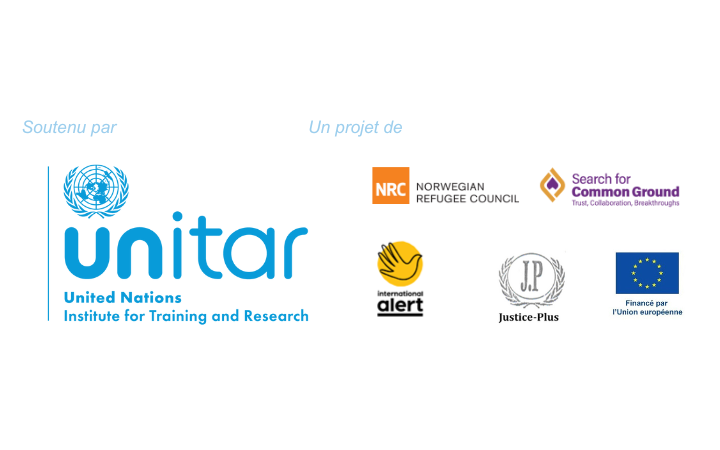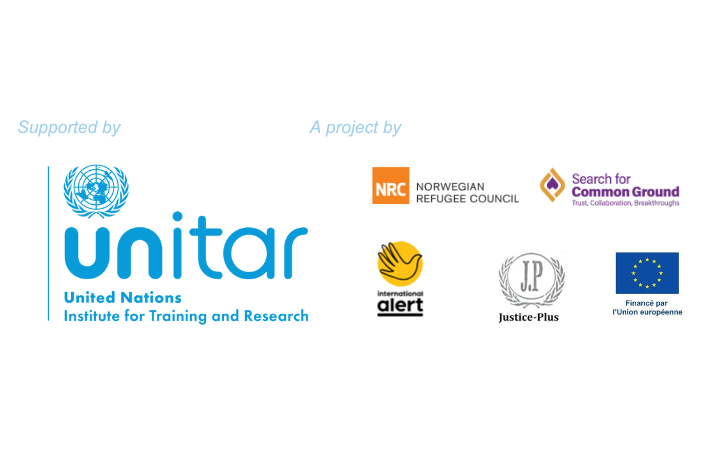LIRE L'ARTICLE EN ANGLAIS CI-DESSOUS
9 Juin 2023, Genève, Suisse - L'Institut des Nations Unies pour la Formation et la Recherche (UNITAR) et le Consortium Cohésion Sociale en RDC, constitué de Norwegian Refugee Council, de Search for Common Ground, d'International Alert et de Justice Plus, ont signé un accord pour que l'UNITAR soutienne le processus de capitalisation du Consortium pour le projet «Contribuer au renforcement de la cohésion sociale et à la stabilisation dans les provinces de l’Ituri et du Nord-Kivu» financé par l’Union Européenne.
Le projet mise en œuvre en consortium vise à contribuer aux efforts de stabilisation et de consolidation de la paix à travers la promotion de la cohésion sociale pour les communautés affectées par les. Le projet utilise une approche holistique, qui implique la mise en place de différents systèmes et stratégies pour traiter les nombreuses causes et conséquences d'un système de cycles de conflit.
Dans ce cadre, les services de l'UNITAR utiliseront l'expertise de la Division pour la Paix en matière de formation et d'apprentissage ainsi que le soutien méthodologique pour contribuer au renforcement des capacités des membres du Consortium à saisir les processus et les approches utilisés pour prévenir et traiter les cycles de conflit, et pour aider à capitaliser les succès du projet. En fin de compte, cela devrait aider le Consortium dans ses actions visant à : Favoriser la collaboration et la confiance entre les communautés et les autorités locales ; Favoriser la cohabitation pacifique entre les membres de la communauté ; Favoriser l’accès des personnes vulnérables aux options de solutions durables au déplacement.
Cette collaboration aidera le consortium cohésion sociale notamment à définir les domaines prioritaires pour la prochaine phase de programmation, en mettant l'accent sur la documentation des meilleures approches et réussis et des changements générés lors de cette première phase, ainsi que sur la conception d'une feuille de route pour la mise en place d'une vaste communauté de pratiques.
UNITAR to Support Social Cohesion Consortium in Documenting Successful Approaches for Strengthened Social Cohesion and Stabilization in the DRC
8 June 2023, Geneva, Switzerland - The United Nations Institute for Training and Research (UNITAR) and the Social Cohesion Consortium in the DRC, comprised of the Norwegian Refugee Council, Search for Common Ground, International Alert, and Justice Plus, have signed an agreement for UNITAR support the Consortium’s capitalisation process for the European Union funded project “Contribution to strengthening social cohesion and stabilization in Ituri and North Kivu provinces”.
The project of the Consortium comes in an effort towards reinforcing the capacities of the state authorities, the creation and reaffirmation of the channels of exchange between the public and governmental services and the community, and finally with communities, to improve everyone's roles and strengthen the links between communities and public services. The project uses a holistic approach, which involves putting in place different systems and strategies to address the numerous causes and consequences of a system of conflict cycles.
Within this framework, UNITAR’s services will utilise the Division for Peace’s training and learning expertise as well as methodological support to contribute to the Consortium’s capacities towards capturing the processes and approaches used to prevent and address conflict cycles and to help capitalise on the project’s successes. In the end, this is anticipated to aid the Consortium in its actions towards supporting community action plans that reinforce social cohesion; supporting community dialogue to foster relationships at the community level, carrying out advocacy to promote the rights of internally displaced persons and support the development of durable solutions, and; supporting town hall meetings for community members and authorities to foster communication at vertical level, amongst other activities.
The collaboration will further help the Consortium define priority areas for the next phase of programming, with a particular focus on capacity-building elements and multiplication processes, as well as with the design of a roadmap towards establishing a wide community of practice.



